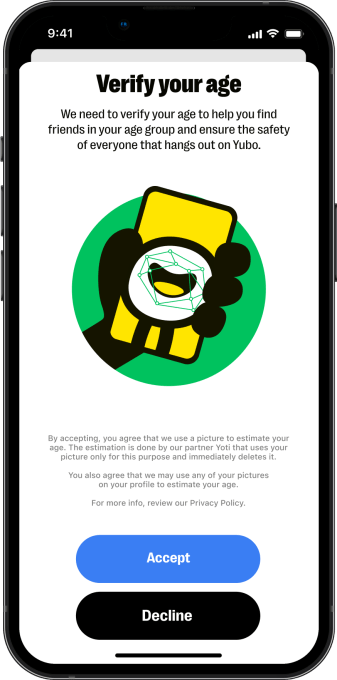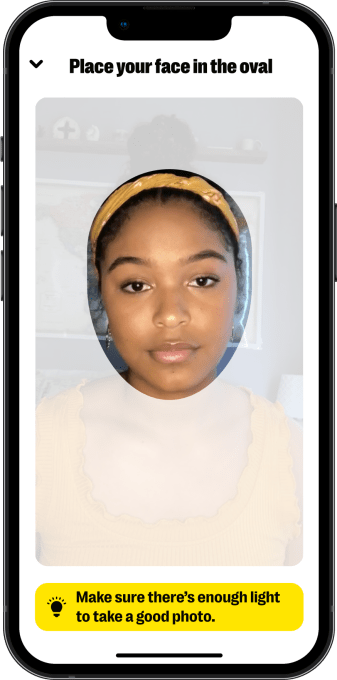Entertainment
Gen Z social app Yubo rolls out age ‘estimating’ technology to better identify minors using its service

Yubo, a social livestreaming app popular with a Gen Z audience, announced today it’s becoming one of the first major social platforms to adopt a new age verification technique that uses live image capture technology to identify minors using its app, in order to keep them separated from adult users. While other companies serving a younger crowd typically rely on traditional age-gating techniques, these are easily bypassed as all that’s generally required is for a user to enter a birthdate in an online form.
Many kids know they can lie about their age to gain access to platforms designed for older users, which is how they end up in online spaces that aren’t kid-friendly or that have greater risks associated with their use.
Yubo, on the other hand, has been thinking about what the future of social networking should look like for the next generation of users — and not just from a product standpoint, but also from a product safety perspective.
Founded in 2015, Yubo users hang out in livestreaming rooms where they can socialize, play games and make new friends. There aren’t creators on the platform broadcasting to fans, and Yubo has no plans to move in that direction — the way that nearly all other major social platforms have today. Instead, its app’s focus is on helping users socialize naturally, the way they’re already comfortable with, after having grown up using services like FaceTime and hanging out with friends in other live video apps.
According to Yubo co-founder and CEO Sacha Lazimi, Generation Z sees “no difference between online and offline life,” he says.
“They have exactly the same needs of socializing offline as online, but there were no solutions [for this],” Lazimi explains. This led Yubo to launch a live video feature that launched to the app’s user base in February 2018.
“We are taking the best of offline interaction and adding to that the power of technology to make sure that you will connect to the right group of people anywhere in the world, at any time, in a safe environment,” he adds.
The company today has seen 60 million sign-ups, which is up from the 40 million it reported in 2020 when it closed on its $47.5 million Series C funding round; 99% of them are Gen Z users, ages 13 to 25.
While Yubo doesn’t share its monthly active users, it notes that it’s seeing increasing revenue via its à la carte premium features and subscriptions, which grew from €7 million in 2019 to now €25 million as of last year. The app doesn’t run ads.
But with this younger audience and growth comes the need for increased safety. Previously, Yubo had partnered with the digital identity provider Yoti to help it vet potentially suspicious users. If people were using different phone numbers or devices, for example, or if they had been reported by others, Yubo would ask them to verify themselves by submitting their IDs. The process of managing the ID verification was handled by Yoti.
On average, Yubo processed 6,500 verifications per day in 2021. Following this verification, 67,000 accounts per month were suspended due to discrepancies in age, the company says.
But there was one challenge with this system — minors often don’t have an ID.
“A lot of teenagers — especially under 18 years old — do not have any identity documents,” notes Lazimi. “So we could not ask everyone to verify their identity.”

Image Credits: Yubo
That led the company to now adopt another Yoti product for age estimations. This system will direct new and existing users to an age verification and agreement screen either during sign-up or as a pop-up for existing users upon launching the app. When they accept, their camera will activate and they’ll be prompted to place their face within an oval that appears on the screen. The “liveness algorithm” also takes a short video that analyzes movement to confirm the image used is not fake or being pulled from a search engine.
When the face has been detected, the user will receive confirmation that they’ve been verified or they’ll be told if their age doesn’t match the age they entered upon sign-up, or that they’re not using a legitimate picture.
If the user’s age is confirmed, they’ll be directed to the homepage and can use Yubo as before. If verification fails, they’ll need to go through a full ID check instead.

Image Credits: Yubo
The new technology, as you may imagine, is not perfect.
Lazimi admits that it works better with younger people’s faces than with adults. Currently, the Yoti age estimation system can effectively identify the ages of 6 to 12-year-old users within 1.3 years, and those between 13 and 19 within 1.5 years, Yoti claims. After that, accuracy decreases. For 20 to 25-year-olds, it’s accurate within a range of 2.5 years. For 26 to 30-year-olds, it’s within an average of 3 years. But this accuracy could improve over time, as more analysis is performed.
“It’s actually very accurate for young users, and especially users under 15…I believe for 13 to 14-year-old users, it’s around 99%,” he says. (It’s 98.9% accurate across all ages, genders and skin tones, says Yoti.). To date, Yoti has run the technology across some 500 million faces, and is certified by software testing service iBeta.
“It’s less accurate for older users — that’s why we’ve launched with the youngest users, because those are the ones we want to protect more and also because it’s more accurate and more precise,” Lazimi says.
The company will initially roll out the technology to 13 and 14-year-old users with the goal of age-verifying 100% of users by the end of 2022.
The age estimation tech is not the first tool that Yubo has adopted to keep younger users safe on livestreams, the company points out.
It’s also using AI technology and human moderation to monitor livestreams by taking second-by-second screenshots, then flagging inappropriate content to human moderators in real time, including nudity, partial nudity (including underwear), suggestive content, drug use, weapons, blood and violence. (You can see some complaints about this in Yubo’s App Store reviews, where teens are complaining it flagged boys for streaming with their shirts off.)
Yubo also includes educational safety features. For example, the app pops up reminders about personalized modification options (like Muted Words), and sends alerts to users if they are participating in harmful and inappropriate behaviors or sharing sensitive personal information. The company has a Safety Advisory Board with international online safety experts, as well.
“We are also working closely with government and NGOs because we believe that social networks need to have stronger regulation from the top,” says Lazimi. But, he adds, “we are not waiting for regulation to do safety features. We are doing it proactively,” he says.
-

 Entertainment7 days ago
Entertainment7 days agoI went to the ‘Severance’ pop-up in Grand Central Station. It was wild.
-

 Entertainment6 days ago
Entertainment6 days agoWhat’s new to streaming this week? (Jan. 17, 2025)
-

 Entertainment6 days ago
Entertainment6 days agoExplainer: Age-verification bills for porn and social media
-

 Entertainment5 days ago
Entertainment5 days agoIf TikTok is banned in the U.S., this is what it will look like for everyone else
-

 Entertainment5 days ago
Entertainment5 days ago‘Night Call’ review: A bad day on the job makes for a superb action movie
-

 Entertainment5 days ago
Entertainment5 days agoHow ‘Grand Theft Hamlet’ evolved from lockdown escape to Shakespearean success
-

 Entertainment5 days ago
Entertainment5 days ago‘September 5’ review: a blinkered, noncommittal thriller about an Olympic hostage crisis
-

 Entertainment5 days ago
Entertainment5 days ago‘Back in Action’ review: Cameron Diaz and Jamie Foxx team up for Gen X action-comedy





















